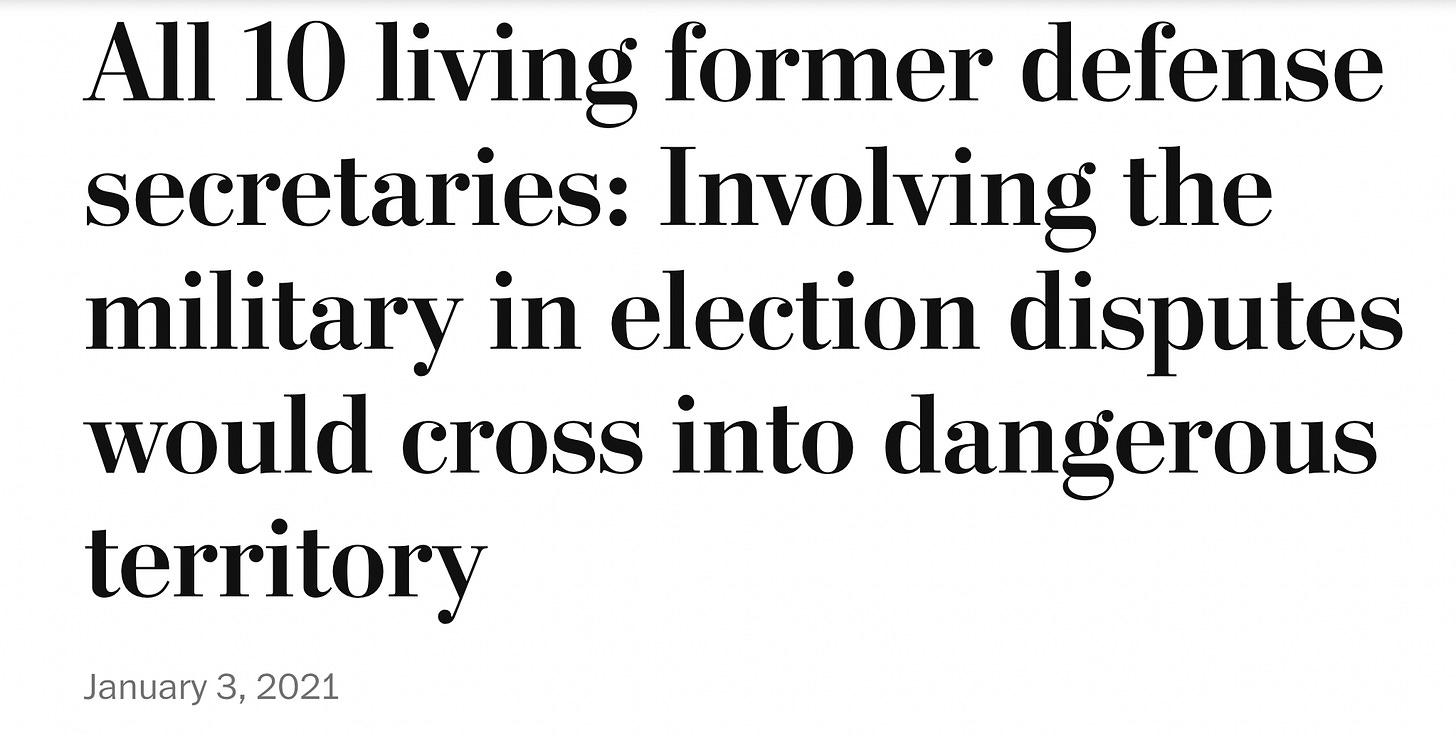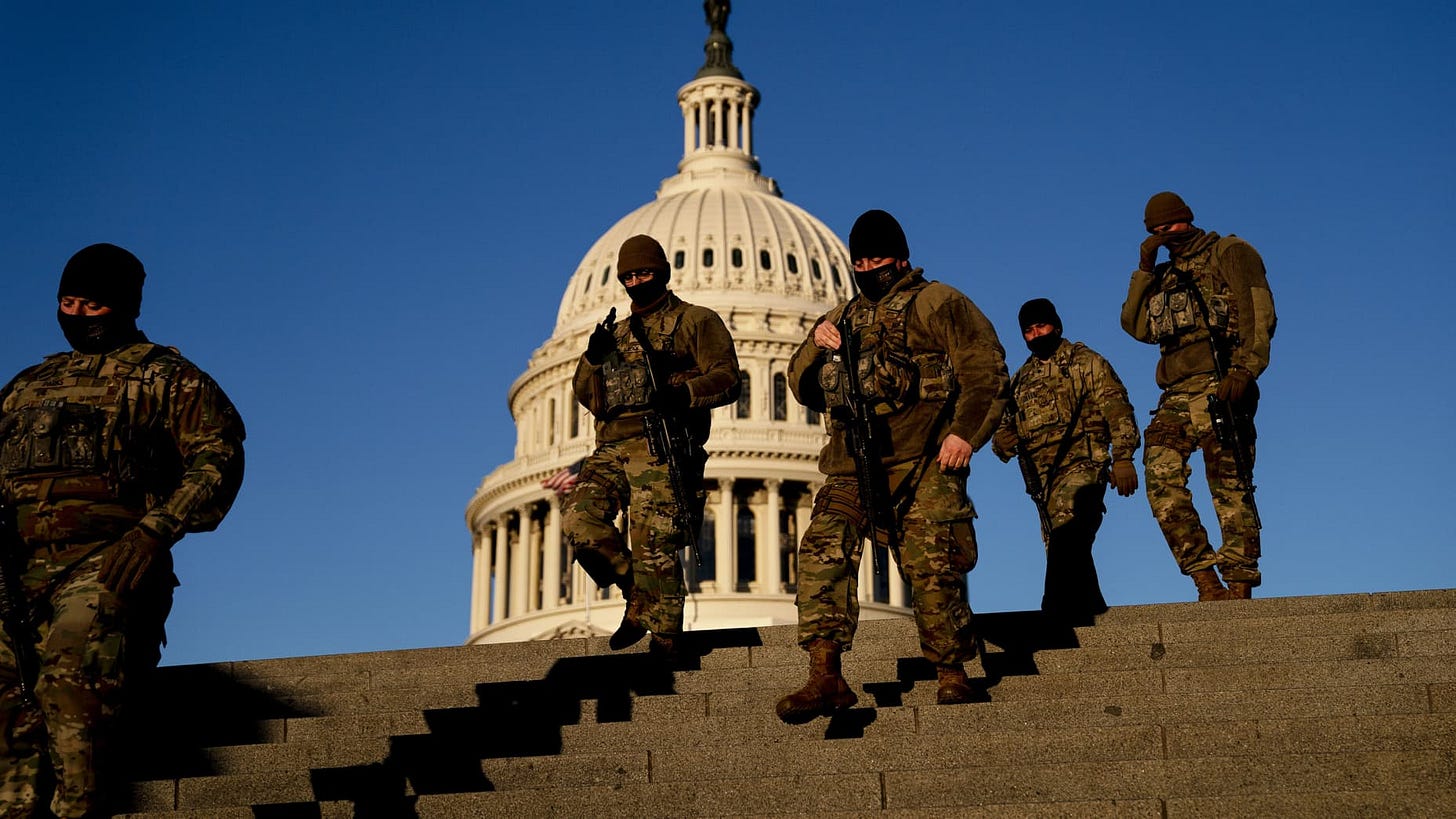SecDef
In early 2021, just days ahead of January 6, every living Secretary of Defense signed onto a letter that ran in the Washington Post. The message: the military doesn't determine the outcome of elections.
“Each of us swore an oath to support and defend the Constitution against all enemies, foreign and domestic. We did not swear it to an individual or a party,” the wrote. “American elections and the peaceful transfers of power that result are hallmarks of our democracy.”
They wrote, before the events on January 6 took place, that “this year should be no exception.” Of course, tragically, it was. At the time the Post published their letter, all sorts of alarm bells were already going off for anyone who was paying attention (unlike in FBI headquarters). The former civilian leaders of our military were deeply concerned, so much so that they went to press with it.
They referred to senior defense leaders who they quoted as weighing in to say, “‘there’s no role for the U.S. military in determining the outcome of a U.S. election.’ Efforts to involve the U.S. armed forces in resolving election disputes would take us into dangerous, unlawful and unconstitutional territory.” They admonished Chris Miller, the acting secretary who had assumed his post most unusually after Trump lost the election in 2020, with his chief of staff, Kash Patel, at his side that “They must also refrain from any political actions that undermine the results of the election or hinder the success of the new team.” Just days later, the two were in place as rioters overran the Capitol.
Our country has a proud tradition of a civilian-led military, designed by the Founding Fathers to avoid the risk of a coup by the military. The Secretary of Defense doesn’t come to the job from active duty, and waivers have to be obtained from Congress for those out of uniform for less than seven years, as President Biden did for Lloyd Austin and Donald Trump did for James Mattis. The irony, then, was that in 2020 it was that same civilian leadership of the military that in no small part was responsible for preventing a president from being the one to insinuate the takeover.
Donald Trump has nominated Pete Hegseth to be the Secretary of Defense. It's a nomination that should have been ended by allegations of financial mismanagement—Hegseth denies them—of an organization whose budget ran into tens of millions, not the $783 billion dollar budget he would oversee at the Pentagon. And, of course, there are the other criticisms that have been leveled at Hegseth, of misogyny and sexual assault, which he also denies, and of excess drinking, of which he says he won’t drink if he’s confirmed.
Politico reported on Thursday that a dozen senators, both Democrats and Republicans, have taken the unusual step of asking for his FBI background investigation. The report relates this interesting detail, “Some Republicans, such as [Maine Republican Sen. Susan] Collins and North Carolina Sen. Thom Tillis, say the claims are serious enough to warrant greater access to the findings. While it’s unlikely the FBI findings would be made public, they could still give Republican senators political cover to vote against Hegseth or support his defense.” Hegseth has said he has nothing to hide and welcomes the FBI background process, so if everyone’s in agreement, let’s get that report into the senators’ hands!
You may recall from the whole affair with Justice Kavanaugh that FBI background investigations aren’t always as fulsome as the seriousness of confirmation proceedings suggest they should be. As in that case, there’s also the possibility that a report could whitewash serious issues by, for instance, failing to speak with all of the witnesses who have information to offer or neglecting leads so that the process can be completed quickly. But the fact that even Republican senators are asking for the report shows that this is a nomination that deserves far greater scrutiny than Donald Trump and his followers want it to get.
As we saw in January of 2021, the Secretary of Defense is one of the most important jobs in government. It’s about leading the military, but it is also, in times of great stress, about upholding the Constitution and the rule of law. The Secretary of Defense is supposed to lead the military and serve the people, not the president. Right now, it’s only the Senate, and let’s be blunt, Republican senators, who can ensure that this next pick is up to the job.
Can you imagine Pete Hegseth signing on to a letter like the one that was written by Ashton Carter, Dick Cheney, William Cohen, Mark Esper, Robert Gates, Chuck Hagel, James Mattis, Leon Panetta, William Perry, and Donald Rumsfeld? Can you imagine him heeding the kind of advice his predecessors, if he’s confirmed, are likely to offer him? It’s not often that you see a group that consists largely of former politicians from both parties, including a Vice President (Cheney), coming forward to make a definitive statement like the one in the Post that January morning. It’s not that it was controversial; perhaps it’s that it wasn’t, but that it desperately needed to be said, nonetheless, in that moment.
At his confirmation hearing, Pete Hegseth needs to be asked, among many other things, if he agrees with the sentiment expressed by the men who held the job he aspires to. If the answer isn’t an unequivocal yes (and it’s unlikely it will be given the context), it’s just another reason he’s not fit to serve.
We’re in this together,
Joyce




When someone who regularly drinks to the point of having to be carried out of the room promises to stop drinking but only if you give him this nifty new job, should you believe him? “…he says he won’t drink if he’s confirmed.”
Hold my beer.
It doesn't matter if the question is asked or not. He will lie. As Kavanaugh lied. As Coney Barrett lied. The only reason to ask the question is give mealy-mouthed Susan Collins a chance to say later, "But, he said..." Why give any of them that cover?